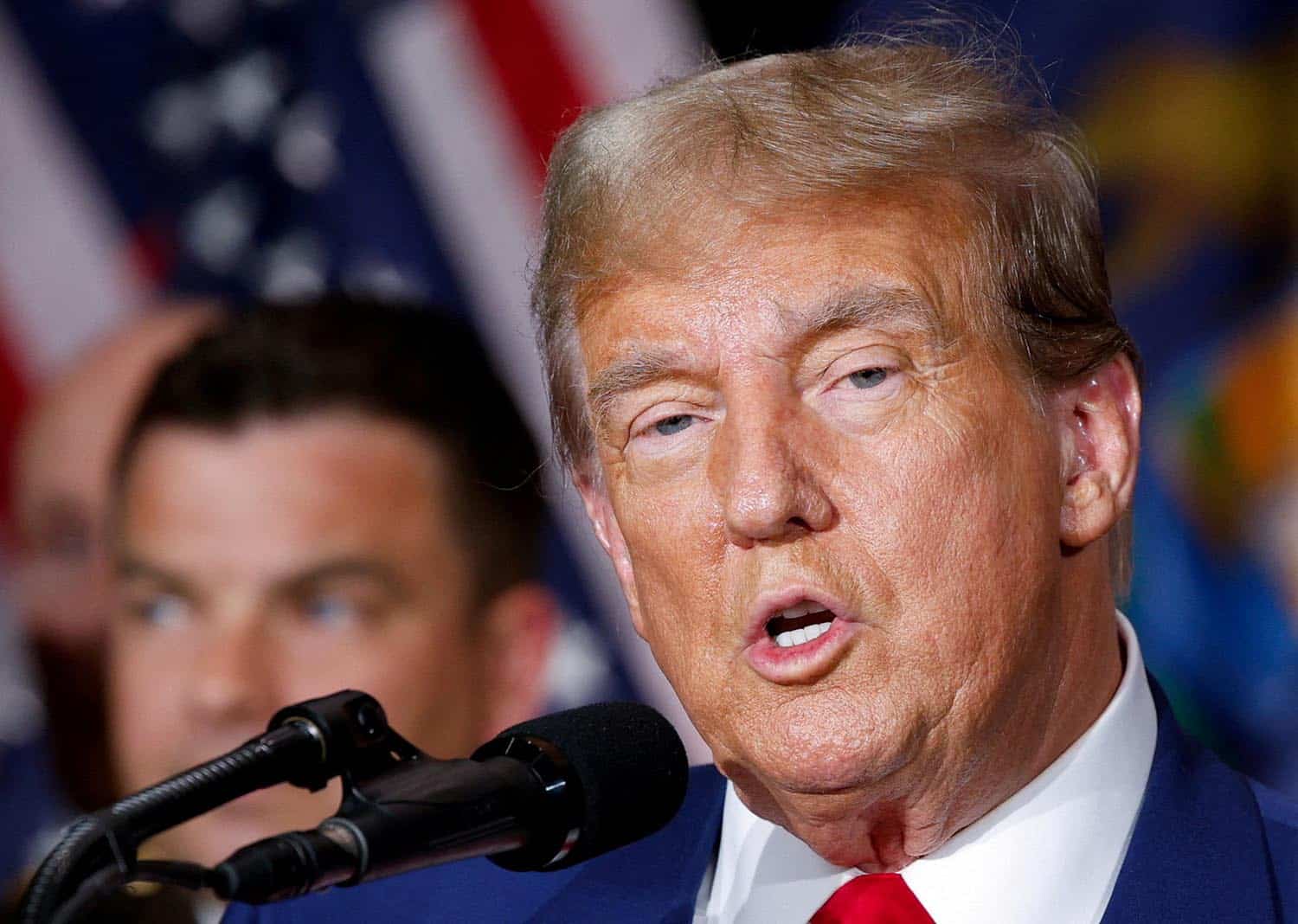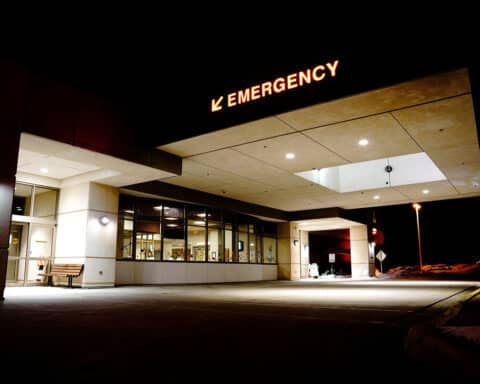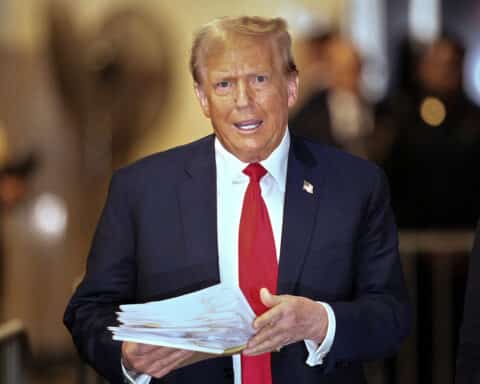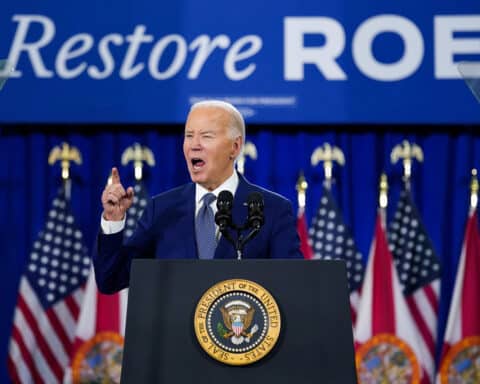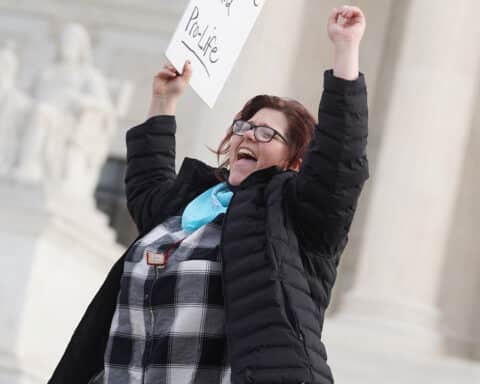WASHINGTON (OSV News) — After announcing his position that abortion should be left to the states to legislate, former President Donald Trump attacked pro-life critics of that position on his social media platform.
After initially arguing closer to the start of his third Republican bid for the White House that abortion should be a matter for the states, Trump reportedly weighed backing a federal limit on abortion after 16 weeks gestation, after expressing dissatisfaction with calls by a prominent pro-life group for 15 weeks. But in an April 8 video announcement, Trump indicated he would prefer to delegate the matter to states rather than Congress.
Criticism from pro-life activists
The decision was met with criticism from pro-life activists, including Marjorie Dannenfelser, president of Susan B. Anthony Pro-Life America, which works to elect pro-life candidates to public office and which previously called on candidates for national office to support federal restrictions on elective abortion after 15 weeks gestation. Dannenfelser, a Catholic, said in a statement on April 8, “We are deeply disappointed in President Trump’s position.”
Sen. Lindsey Graham, R-S.C., wrote on X, formerly Twitter, “I respectfully disagree with President Trump’s statement that abortion is a states’ rights issue.”
“Dobbs does not require that conclusion legally and the pro-life movement has always been about the wellbeing of the unborn child — not geography,” Graham said.
Republican performance and abortion Issue
Trump blasted the pair in a series of posts on his social media platform Truth Social, indicating that pro-life activists’ national strategy was a poor deal for Republicans.
“Senator Lindsey Graham and Marjorie Dannenfelser should study the 10th Amendment and States’ Rights. When they do, they should proudly get on with helping Republicans to WIN ELECTIONS, rather than making it impossible for them to do so!” Trump wrote in one such post.
Trump wrote in another post that as a result of delegating the issue to the states, “Republicans are now free to run for Office based on the Horrible Border, Inflation, Bad Economy, and the Death & Destruction of our Country!”
The Washington Post reported April 9 that Trump wavered on the decision in the lead-up to the April 8 video; but he has complained to allies that Republicans have hurt themselves on abortion, calling it a “bad issue” for the party in private conversations.
On several occasions, Trump has blamed the issue of abortion and pro-life voters for the Republican Party’s underperformance in the 2022 midterm election cycle — a theme he repeated in his April 8 social media posts.
In one Truth Social post, he wrote, “When the Supreme Court had the courage to do the right thing LEGALLY, and terminate Roe v. Wade, all of those people, including Lindsey Graham and Marjorie Dannenfelser of Susan B. Anthony that were ‘hardliners’, one day after the Victory, were gone and of absolutely no help, as the Democrats staged rallies and won Elections they should never have won.”
Analysts, by contrast, blamed in part quality issues with Republican campaigns in that cycle and Trump’s repeated, unproven claims of a stolen 2020 election for the party’s underperformance. However, several states have enacted abortion protections as the result of ballot measures since Dobbs: voters in Ohio, California, Kentucky, Michigan, Montana, Vermont and Kansas either rejected new limitations on abortion or expanded legal protections for it.
Abortion on the ballot
But abortion itself will be on the ballot again in several states in November, including Florida and likely Arizona, where a closely-watched race for the U.S. Senate is also taking place.
John White, a professor of politics at The Catholic University of America in Washington, told OSV News, “Trump’s announcement pleases no one.”
“The pro-lifers are upset, including his former Vice President Mike Pence,” White said. “Those who opposed overturning Roe were never happy with Trump and this does nothing to change that.”
“He’s going to be haunted by this issue from now to November,” he added.
Trump’s position
In the April 8 video, Trump took credit for the Supreme Court’s 2022 decision in Dobbs v. Jackson Women’s Health Organization, which overturned its previous abortion precedent since the 1973 Roe v. Wade decision. But Trump said that “my view is now that we have abortion where everybody wanted it from a legal standpoint, the states will determine by vote or legislation or perhaps both, and whatever they decide must be the law of the land. In this case, the law of the state.”
However, O. Carter Snead, director of the de Nicola Center for Ethics and Culture at the University of Notre Dame, told OSV News, “Nothing in the Dobbs decision — which President Trump celebrated — precludes the federal political branches from regulating abortion.”
Snead, a professor of both law and political science, said Trump’s announcement “was striking in that it almost entirely avoided the substance of the abortion debate and focused narrowly on the procedural point that it should be decided by states rather than the federal government.”
Snead said that Trump’s statement lacked cohesion, alternately suggesting support for certain pro-life initiatives while criticizing others.
“He repeatedly emphasized that people should ‘follow your heart on the issue’ and noted that different states would adopt different laws,” Snead said. “He never quite said what he thinks justice under law requires for unborn children and their mothers, but hinted at disapproval of late-term abortions and refusal to provide life-sustaining care for newborns who survive abortions. He mentioned that he supports exceptions for rape, incest, and life of the mother — but oddly, did not specify the laws themselves to which such exceptions would apply. He did not endorse or criticize any state laws in particular, though in the past he has seemed to express disapproval of Florida’s heartbeat law.”
Snead said Trump’s April 8 video also raised questions about his views on existing or potential federal pro-life protections.
“The speech was also odd in that it failed to mention important longstanding and widely popular federal laws on abortion, such as the federal partial-birth abortion ban, the Born Alive Infants Protection Act, and most importantly, the Hyde Amendment, which prohibits federal funding of most abortions under Medicaid,” he said. “In particular, the Hyde Amendment has had the single greatest impact on reducing the overall number of abortions in America. President Biden has vowed to repeal it.”
Snead noted, “For the 2024 election, it remains to be seen whether Mr. Trump’s neutrality will be enough for pro-life voters in light of President Biden’s decision to make maximal abortion access a centerpiece of his campaign.”
Church teaching
The Catholic Church teaches that all human life is sacred from conception to natural death, opposing direct abortion as an act of violence that takes the life of the unborn child.
After the Dobbs decision, Church officials in the United States have reiterated the Church’s concern for both mother and child, and called to strengthen available support for those living in poverty or other causes that can push women toward having an abortion.

